A former bingo hall, this Wetherspoon pub takes its name from the actor who appeared in 47 films with Laurel and Hardy. Charlie Hall was born on 19 August 1899, in a small cottage at 23 Washwood Heath Road, Ward End, Birmingham.
Illustrations, prints and text about the early days of Erdington.
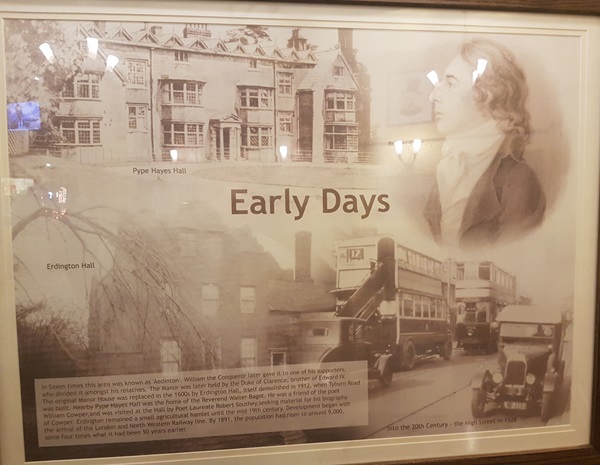
The text reads: In Saxon times this area was known as ‘Aedinton’. William the Conqueror later gave it to one of his supporters, who divided it amongst his relatives. The manor was later held by the Duke of Clarence, brother of Edward IV. The original Manor House was replaced in the 1600s by Erdington Hall, itself demolished in 1912, when Tyburn Road was built. Nearby Pype Hayes Hall was the home of the Reverend Walter Bagot. He was a friend of the poet William Cowper, and was visited at the hall by poet Laureate Robert Southey, seeking material for his biography of Cowper. Erdington remained a small agricultural hamlet until the mid 19th century. Development began with the arrival of the London and North Western Railway line. By 1891, the population had risen to around 9,000, some four times what is had been 50 years earlier.
Illustrations and text about the trial of Abraham Thornton.
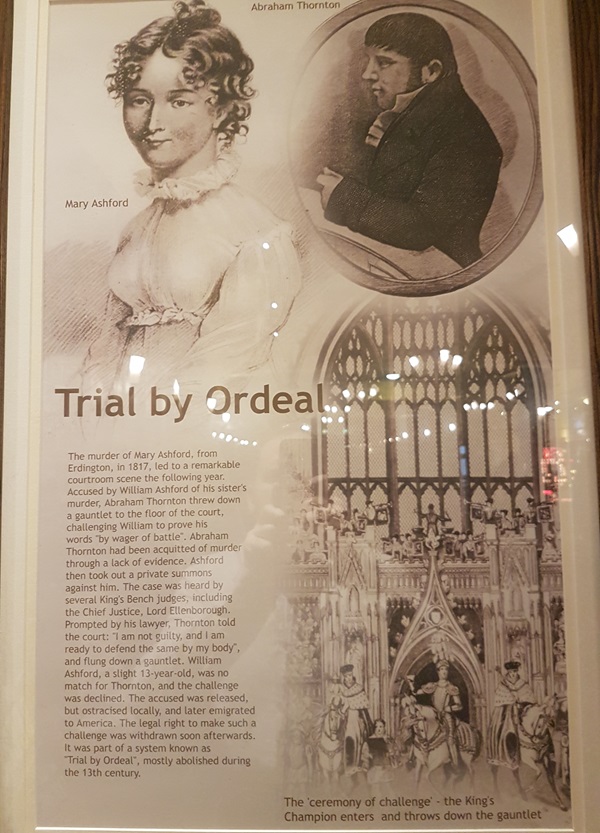
The text reads: The murder of Mary Ashford, from Erdington, in 1817, led to a remarkable courtroom scene the following year. Accused by William Ashford of his sister’s murder, Abraham Thornton threw down a gauntlet to the floor of the court, challenging William to prove his words “by wager of battle”. Abraham Thornton has been acquitted of murder through a lack of evidence. Ashford then took out a private summons against him. The case was heard by several King's bench judges, including the Chief Justice, Lord Ellenborough. Prompted by his lawyer, Thornton told the court: “I am not guilty, and I am ready to defend the same by my body”, and flung down a gauntlet. William Ashford, a slight 13 year old, was no match for Thornton, and the challenge was declined. The accused was released, but ostracised locally, and later emigrated to America. The legal right to make such a challenge was withdrawn soon afterwards. It was part of a system known as Trial by Ordeal, mostly abolished during the 13th century.
Photographs and text about Charlie Hall.
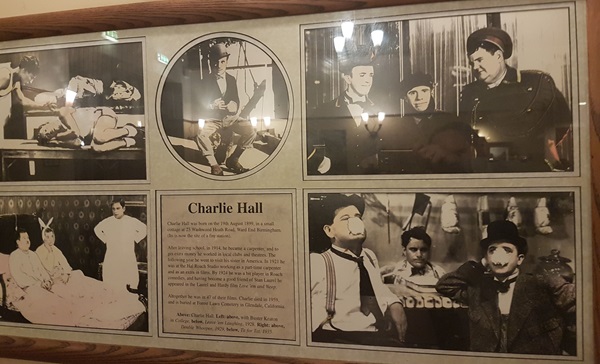
The text reads: Charlie Hall was born on the 19 August 1899, in a small cottage at 23 Washwood Heath Road, Ward End Birmingham. (It is now the site of a fire station).
After leaving school, in 1914, he became a carpenter, and to get extra money he worked in local clubs and theatres. The following year he went to visit his sister in America. In 1921 he was at the Hal Roach Studio working as a part-time carpenter and as an extra in films. By 1924 he was a bit player in Roach comedies, and having become a good friend of Stan Laurel he appeared in the Laurel and Hardy film Love ‘em and Weep.
Altogether he was in 47 of their films. Charlie died in 1959, and is buried at Forest Lawn Cemetery in Glendale, California.
Above: Charlie Hall
Left: above, with Buster Keaton in College, below, Leave ‘em Laughing, 1928
Right: above, Double Whoopee, 1929, below, Tit for Tat, 1935.
Illustrations and text about John Jaffray and Andrew Carnegie.
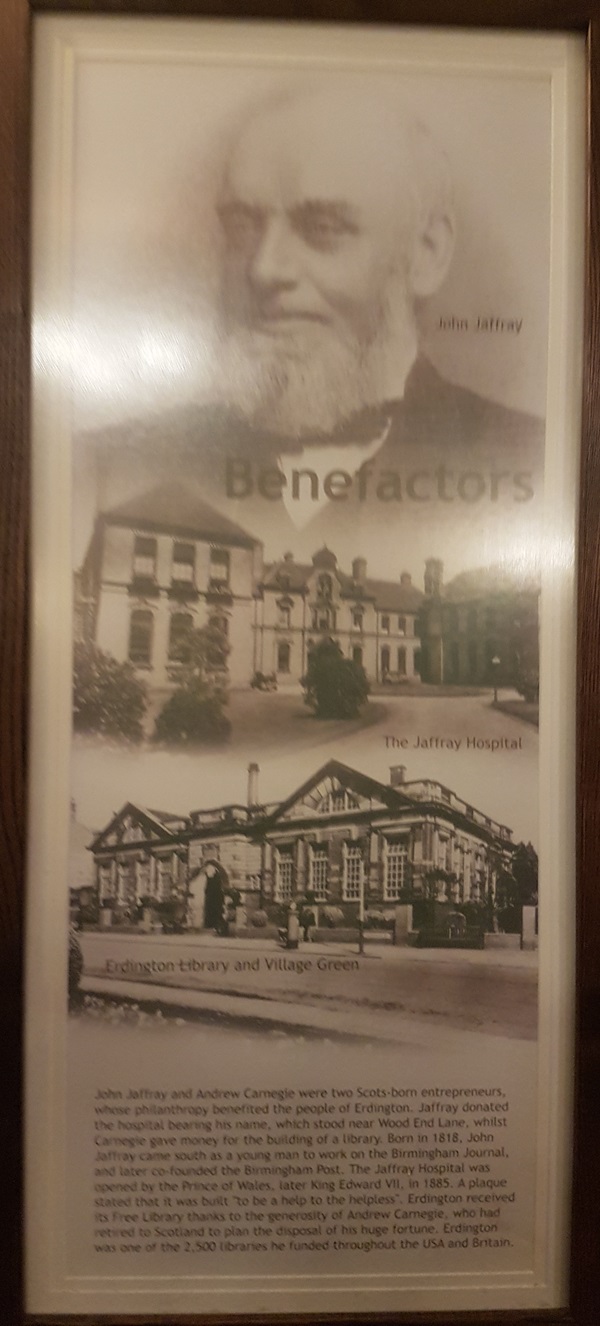
The text reads: John Jaffray and Andrew Carnegie were two Scots-born entrepreneurs, whose philanthropy benefited the people of Erdington. Jaffray donated the hospital bearing his name, which stood near Wood End Lane, whilst Carnegie gave money for the building of a library. Born in 1818, John Jaffray came south as a young man to work on the Birmingham Journal, and later co-founded the Birmingham Post. The Jaffray Hospital was opened by the Prince of Wales, later King Edward VII, in 1885. A plaque stated that is was built “to be a help to the helpless”. Erdington received its Free Library thanks to the generosity of Andrew Carnegie, who had retired to Scotland to plan the disposal of his huge fortune, Erdington was one of the 2,500 libraries he funded throughout the USA and Britain.
Illustrations and text about Sir Josiah Mason.
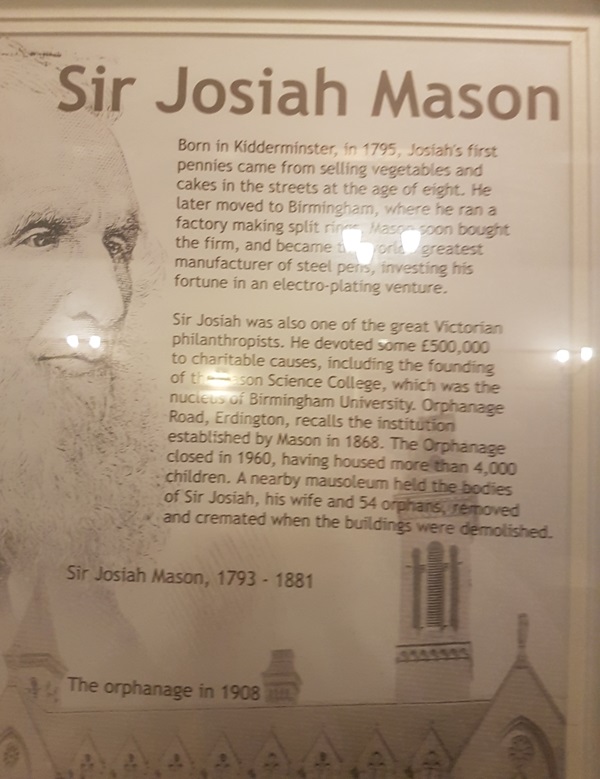
The text reads: Born in Kidderminster, in 1795, Josiah’s first pennies came from selling vegetables and cakes in the streets at the age of eight. He later moved to Birmingham, where he ran a factory making split rings. Mason soon bought the firm, and became the world’s greatest manufacturer of steel pens, investing his fortune in an electro-plating venture.
Sir Josiah was also one of the great Victorian philanthropists. He devoted some £500,000 to charitable causes, including the founding of the Mason Science College, which was the nucleus of Birmingham University. The orphanage closed in 1960, having housed more than 4,000 children. A nearby mausoleum held the bodies of Sir Josiah, his wife and 54 orphans, removed and cremated when the buildings were demolished.
A collection of photographs of Old Town.
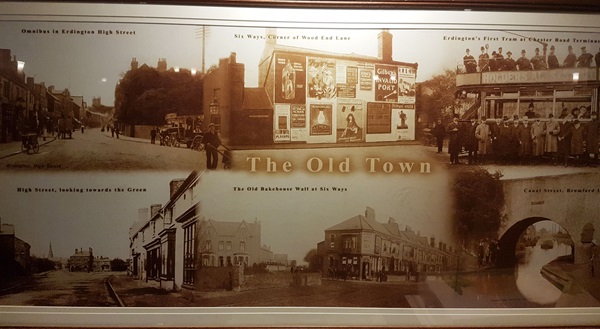
If you have information on the history of this pub, then we’d like you to share it with us. Please e-mail all information to: pubhistories@jdwetherspoon.co.uk